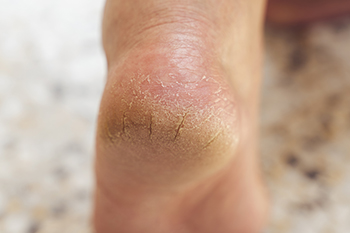
Cracked heels, medically known as heel fissures, occur when the skin around the heel becomes dry, thickened, and eventually splits. This common foot condition can cause discomfort, pain, and even bleeding in severe cases. Several factors contribute to cracked heels, including prolonged standing, walking barefoot, wearing open-back shoes, and dry weather conditions. Individuals with naturally dry skin or certain medical conditions such as diabetes or thyroid disorders are at a higher risk of developing cracked heels. Additionally, factors like obesity, dehydration, and poor foot hygiene can exacerbate the problem. The lack of moisture and exfoliation leads to the build-up of dead skin, creating pressure on the heels and increasing the likelihood of cracking. Prevention is important, and this can be achieved by maintaining proper foot hygiene, moisturizing regularly, wearing appropriate footwear, and avoiding prolonged standing. If you have developed cracked heels, it is suggested that you schedule an appointment with a podiatrist who can prescribe the necessary treatment for relief.
If the skin on your feet starts to crack, you may want to see a podiatrist to find treatment. If you have any concerns, contact one of our podiatrists from Waterbury Podiatry Consultants. Our doctors can provide the care you need to keep you pain-free and on your feet.
Cracked Heels
It is important to moisturize your cracked heels in order to prevent pain, bleeding, and infection. The reason cracked heels form is because the skin on the foot is too dry to support the immense pressure placed on them. When the foot expands, the dry skin on the foot begins to split.
Ways to Help Heal Them
- Invest in a good foot cream
- Try Using Petroleum Jelly
- Ease up on Soaps
- Drink Plenty of Water
Ways to Prevent Cracked Heels
- Moisturize After Showering
- Skip a Shower
- Keep Shower Water Lukewarm
- Don’t Scrub Your Feet
If you are unsure how to proceed in treating cracked heels, seek guidance from a podiatrist. Your doctor will help you with any questions or information you may need.
If you have any questions, please feel free to contact our offices located in Waterbury and Southington, CT . We offer the newest diagnostic and treatment technologies for all your foot care needs.
